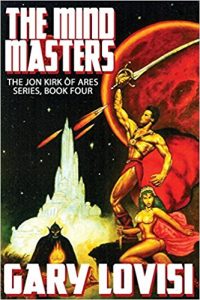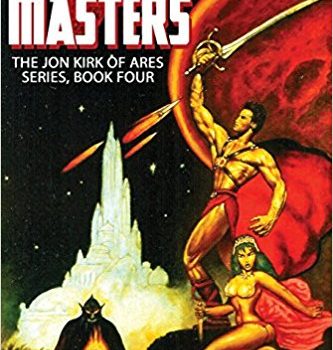Richard A. Lupoff Reviews The Mind Masters and The Time Masters by Gary Lovisi
The Mind Masters, Gary Lovisi (Wildside 978-1-4794-2786-4, $12.99, 152pp, tp) July 2017.
The Time Masters, Gary Lovisi (Wildside 978-1-4794-2789-5, $12.99, 156pp, tp) July 2017.
 English novelist Edwin Lester Arnold created the interplanetary romance or “swords and planets” novel with Lieut. Gullivar Jones: His Vacation (1905), or at least I have so contended for many years. Edgar Rice Burroughs unquestionably perfected Arnold’s formula in his series of novels set on the planet Barsoom, starting with A Princess of Mars (1912). Burroughs even borrowed the immortal swashbuckling Lepidus the Centurion from an earlier Arnold opus, substituting this heroic figure, now dubbed John Carter, for Arnold’s mild-mannered Jones.
English novelist Edwin Lester Arnold created the interplanetary romance or “swords and planets” novel with Lieut. Gullivar Jones: His Vacation (1905), or at least I have so contended for many years. Edgar Rice Burroughs unquestionably perfected Arnold’s formula in his series of novels set on the planet Barsoom, starting with A Princess of Mars (1912). Burroughs even borrowed the immortal swashbuckling Lepidus the Centurion from an earlier Arnold opus, substituting this heroic figure, now dubbed John Carter, for Arnold’s mild-mannered Jones.
Burroughs inspired a long line of admirers who created works in homage to Burroughs’s series. A few of the more prominent writers in this group include Otis Adelbert Kline, Leigh Brackett, Robert E. Howard, Mike Resnick, and Michael Moorcock (writing as Edward P. Bradbury). The formula has become familiar: an Earthly man, often military in background – Gullivar Jones was a lieutenant in the United States navy; John Carter had been a captain in the Confederate cavalry – is whisked by mystical means to an alien planet. Both Jones and Carter found themselves on Mars, Jones having travelled by flying carpet and Carter by astral projection.
In this new world the hero discovers that he is able to breathe the thin atmosphere and otherwise survive. He encounters survivors of an ancient civilization. There are also native flora and fauna of a wildly varied nature. Warfare is rife, and the newcomer, thanks to his military background and his skills as a talented swordsman, fights his way up through the ranks of the dominant nation, eventually becoming first a military commander, then a king, and eventually the ruler of the entire planet.
Oh, did I mention that the humans or humanoid residents of the planet come in a variety of colors? In the case of Burroughs’s version, they are also oviparous. John Carter eventually marries the red-tinted Princess Dejah Thoris and they become parents. The exact biological details are decorously omitted from the author’s prose.
Now, for Gary Lovisi: a longtime fan and admirer of Edgar Rice Burroughs and his works, Lovisi is the editor and publisher of the influential magazine Paperback Parade. In recent years he has become an increasingly prolific author in his own right. His works have ranged from westerns and crime fiction, to pastiches of the Sherlock Holmes canon, to interplanetary romances. The two books at hand are in fact the fourth and fifth volumes of the saga of Jon Kirk. This fellow had been a sergeant, serving with the United States army in Vietnam.
Apparently killed by enemy fire, he found himself miraculously transported to the planet Ares. Once there, his exploits follow the classic pattern established by Burroughs. The civilization of Ares is an ancient one. The major races are the green-skinned, red-haired humans and the paradoxically invisible blue people. The planet has been conquered by the alien Wing Men. Hmm, think of the winged alien “devils” of Arthur C. Clarke’s Childhood’s End.
As was the case with Burroughs’s Barsoomian civilization, Lovisi’s Ares is furnished with a variety of technologically advanced weapons and other devices, including death-ray pistols and rifles, yet both the residents of Barsoom and of Ares conduct most of their combat with swords. Go figure.
Jon Kirk predictably fights his way up through the ranks of the green people (despite being a 20th-century soldier, he happens to be a superb swordsman) and along the way marries the lovely green-skinned Sirah. Kirk leads the admiring armies of Ares in a successful rebellion against the Wing Men, and as his reward is made Emperor of the planet.
By the end of the first trilogy in Lovisi’s series, it might seem that there is nowhere else for Kirk to go, no more worlds for him to conquer – but of course it is not easy for the author of a successful series to abandon his creation, be he or she named Arthur Conan Doyle, Edgar Rice Burroughs, Agatha Christie, Edmond Hamilton or – well, name your own series author.
In The Mind Masters, Lovisi introduces a new and powerful villain to challenge Jon Kirk. This character’s name is nothing less portentous than Lord Doom, and before he has finished his nasty work, he has – no, I won’t issue a spoiler alert. Lord Doom’s handiwork is truly shocking. I’ll tell you that it knocked me for a loop. Suffice to say that Lovisi seeks to broaden his canvas beyond Burroughs’s example.
While Burroughs mostly limited himself to Mars and its moons (save for the novelette “Skeleton Men of Jupiter”) Lovisi turns his back on the planetary romance and plunges headlong into space opera. Lovisi describes huge space battles involving hundreds if not thousands of spaceships. The problems of travel not only between planets in the same solar system but between solar systems didn’t bother Edmond Hamilton, at least in the early years of his career, nor do they bother Jon Kirk – or Gary Lovisi. Yes, there are strong suggestions of Hamilton or Edward Elmer Smith in these Jon Kirk books. If you have trouble suspending disbelief in order to enjoy extravagant science fiction, look elsewhere than here. But if you’re will to go with the flow, and if you have read all of Edgar Rice Burroughs’s interplanetary romances and are desperate for more of that great old stuff, you could do a lot worse than give Gary Lovisi’s Jon Kirk series a try. I imagine that it’s usually wise to read a series from the beginning, and the earlier Jon Kirk books are almost certainly available from Wildside Press, one of the larger and more stable POD publishers in the industry.
Lovisi’s style, I must warn you, can be a trifle rough around the edges. Be prepared to forgive the occasional solecism in return for the sincerity and even passion of the devoted acolyte.
This review and more like it in the November 2017 issue of Locus.







